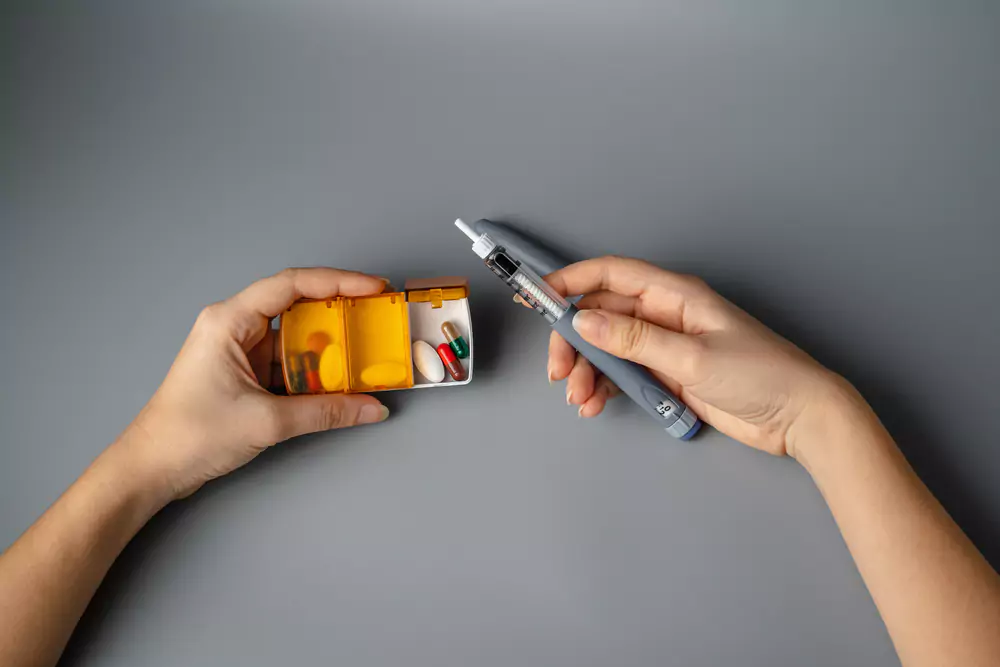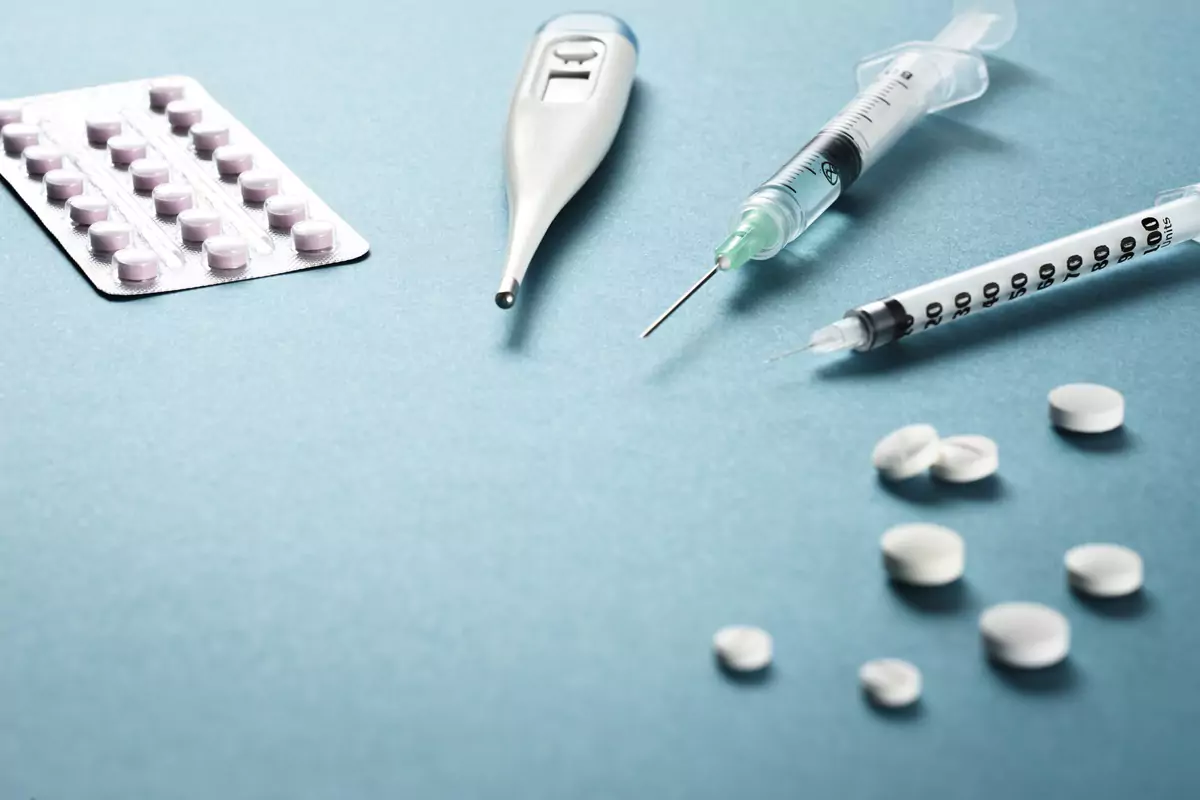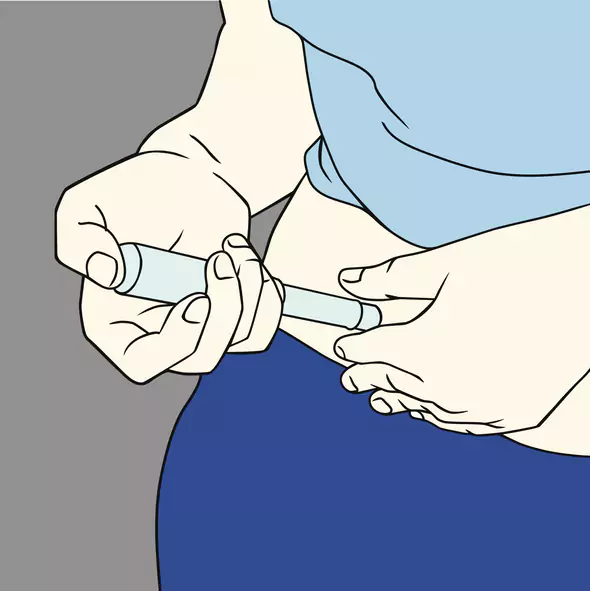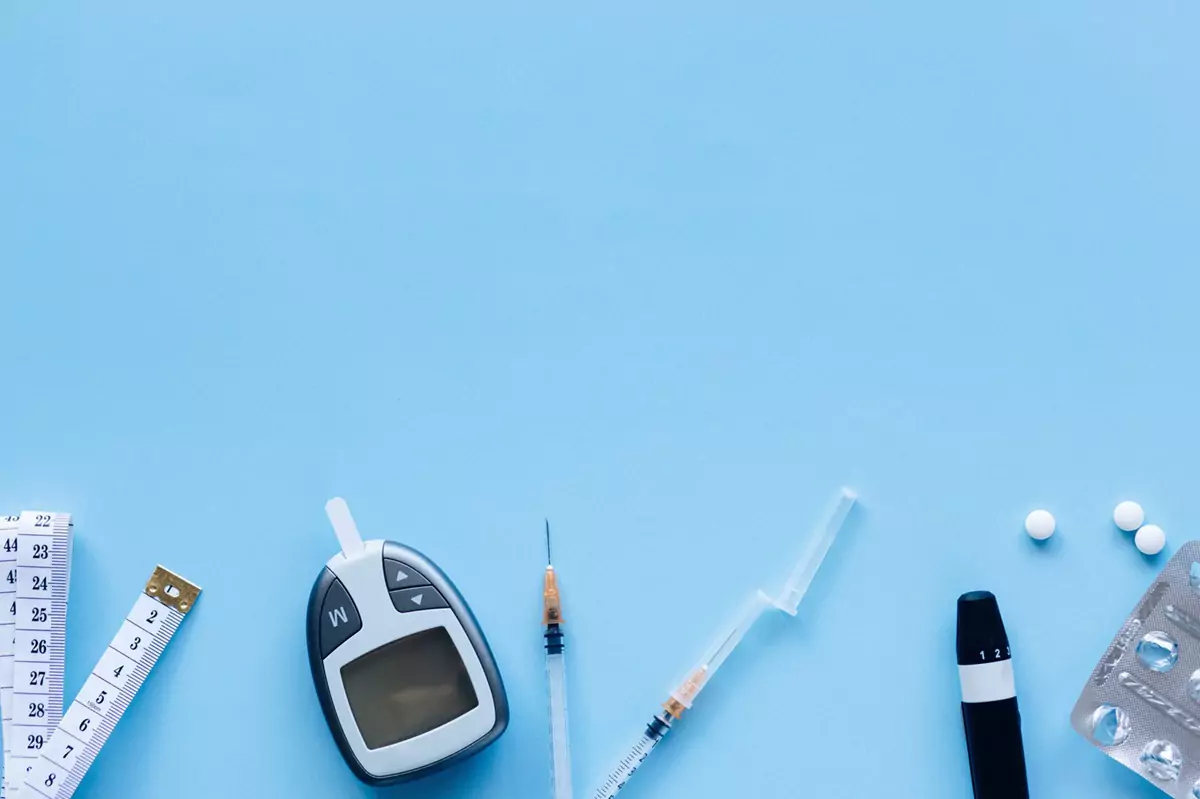
UP TO 40% OFF SITEWIDE






Novolog Side Effects: What You Need to Know


Table of Contents
- What are the Common Side Effects of Novolog?
- Nausea
- Weight Gain
- Diarrhea
- Dizziness
- Headache
- Mild side effects of Novolog
- Injection site reactions
- Skin Irritation or Rash
- Nasopharyngitis
- Hypoglycemia
- Fluid Retention
- Potential Serious Side Effects of Novolog
- Hypokalemia
- Allergic Reactions
- Severe Hypoglycemia
- Frequently Asked Questions
- Does Novolog cause weight loss?
- Does Novolog cause Fatigue?
- Does Novolog cause Hair loss?
- Does Novolog cause Burping?
- Does Novolog Cause Joint Pain?
- How Can I Avoid Side Effects from Novolog?
- Conclusion
- About The Author
In previous articles, we've covered the side effects of Humalog and Tresiba, and now we'll move on to Novolog; nevertheless, it's crucial to remember that the active element in all three drugs is insulin. Therefore they all have a pretty similar set of side effects. First, let's go over some of Novolog's general characteristics, and then we'll talk about its common, mild, and severe adverse effects.
Novolog is a type of fast-acting insulin designed to help control blood sugar levels in people with diabetes. It is “mealtime” insulin, meaning it is taken at the same time as food to help digest carbohydrates and other sugars. Novolog is a clear, colorless solution and is injected under the skin. Novolog is a synthetic form of insulin and is part of the class of medications known as short-acting insulin analogs.
It is widely used for people with Type 1 and Type 2 diabetes. It also can be used to help with blood sugar control in people with gestational diabetes and other forms of diabetes. Novolog is one of the more popular insulin analogs due to its efficacy and convenience. It works quickly and is able to help manage blood sugar levels efficiently.
What are the Common Side Effects of Novolog?
If you're taking Novolog, you should know that it comes with a side. You should be aware of a few common side effects of this medication, from nausea to headaches. When using Novolog as directed, side effects are often minor and transient. Novolog's blood sugar-lowering effects reach their peak within one to three hours and often remain for three to five hours.
The quantity and strength of insulin administered, the level of blood sugar, and the intensity of symptoms all affect how long its side effects last. For example, the prevalence and seriousness of hypoglycemia can be impacted by the use of different types of insulin or anti-diabetic drugs, while it may take days or months for some adverse effects, like weight gain, extreme hypersensitivity reactions, and skin changes, to go away. Here are a few of the side effects that NovoLog users frequently reported experiencing:
Nausea
Nausea is a common side effect of Novolog, an insulin medication used to help control blood sugar levels. Novolog insulin side effects may vary from person to person and may range from mild to severe. Nausea is one of Novolog's most commonly reported side effects, so it’s important to be aware of the potential risks.
When it comes to nausea, it’s important to remember that everyone experiences it differently. Some people may have a mild feeling of nausea, while others may experience more intense or prolonged experiences. Symptoms of nausea related to Novolog include an upset stomach, vomiting, dizziness, lightheadedness, and sweating.
These symptoms can range from mild to severe and should always be taken seriously. You can do a few things to minimize the chances of nausea from Novolog. First, following your doctor’s instructions for taking the medication is important. Make sure to take it as prescribed and be aware of any changes in your dosage.
Additionally, choose a diet low in fat and simple sugars, as this may help reduce the chances of feeling nauseous. It’s also important to stay hydrated and avoid alcohol and caffeine. Overall, nausea is a common side effect of Novolog.
It is important to remember that everyone experiences nausea differently and to stay informed of potential risks. Taking the medication as prescribed, following a healthy diet, and staying hydrated can help minimize the chance of experiencing nausea or any other Novolog insulin side effects.
Weight Gain
Taking Novolog may cause some users to put on weight, either through an increase in appetite or from fluid retention. The insulin in the drug may boost signals for hunger, leading to this result. The body may also retain more water than usual, leading to a momentary weight gain.
In order to reduce the risk of gaining too much weight while taking Novolog, it is suggested that a healthy calorie balance be maintained. A healthy weight can be maintained by regular exercise and a balanced diet that includes lots of vegetables, fruits, and other nutrient-rich meals.
Keeping up with a consistent exercise routine is also crucial for preventing unwanted weight gain. To know more about weight and diabetes, check out this video:
Diarrhea
One of the most common side effects of the Novolog insulin injection is diarrhea. An unexpected and sudden bout of diarrhea can be uncomfortable, embarrassing, and even dangerous if it becomes too severe and is left untreated. Knowing more about the possible symptoms and taking precautionary measures can help you manage them effectively.
Diarrhea can occur in both short and long-term use of the medication. When experiencing diarrhea due to Novolog, one may experience cramps, an increase in bowel movements, and watery stools. Some individuals may also experience nausea, dizziness, and abdominal pain.
If diarrhea persists or worsens despite taking precautionary measures, it is advised to seek medical attention immediately. To help manage and prevent Novolog-induced diarrhea, individuals may reduce the dose of the medication or switch to a different insulin.
They should also practice healthy eating habits, such as avoiding foods high in sugar, fat, and cholesterol and drinking plenty of water. Additionally, individuals should avoid any activities that will require them to move around or exercise abruptly after taking the injection since this may also lead to diarrhea. Taking preventive measures and making lifestyle changes to help manage this side effect can prevent it from becoming worse or more disruptive.
Dizziness
One of the most concerning side effects of Novolog insulin is dizziness. Dizziness is a common side effect and can be caused by a variety of factors. This side effect can be particularly dangerous, as it can impair one’s ability to drive, operate machinery, and even perform everyday activities such as walking and climbing stairs. It’s important to understand the underlying causes of Novolog side effects and the symptoms of dizziness so that you can take the necessary steps to avoid them.
Novolog insulin is a synthetic hormone that plays an important role in helping your body use and store glucose. This can affect your blood sugar levels, making them fluctuate too quickly, causing dizziness and disorientation. Another way that Novolog's insulin side effects can manifest is a feeling of lightheadedness.
This is caused by a drop in blood pressure, which can be caused by Novolog and other medications. If you find that you become lightheaded after taking Novolog, it’s important to drink plenty of fluids and monitor your blood sugar levels to avoid a dangerous drop in sugar levels. Additionally, avoid activities that may trigger lightheadedness, such as standing for long periods or strenuous physical activity.
Headache
An incorrect dosage is one of the most common causes of a Novolog-induced headache. It’s important to ensure that your dose is appropriate for your body, as too much or too little insulin can cause a headache. It’s best to speak to your doctor to determine the right dosage for you. Another cause of Novolog-induced headaches is dehydration.
When you take insulin, your body needs extra hydration. Make sure that you are drinking plenty of water throughout the day to help avoid headaches. It’s also important to watch for signs of low blood sugar, which can also cause headaches. If you experience headaches on a regular basis, there are some steps you can take to reduce their intensity. One way is to consider lifestyle changes.
If you’re not getting enough sleep or exercise, your body may be under more stress than normal. Eating well and managing stress can help reduce the frequency and intensity of your headaches. Headaches can also be associated with certain medications or supplements.
Before you take any supplement or medication, make sure to speak to your doctor first. It’s important to be aware of the side effects of Novolog insulin, including headaches. With the right treatment, you should be able to reduce or eliminate your symptoms.
Mild side effects of Novolog
Injection site reactions
A joke about not liking needles or being terrified of getting wounded by a needle poke is a common opening line for hospital room chats. There may be minor pain when a needle punctures the skin, but what is an injection-site reaction? An injection-site reaction is typically defined as any pain, swelling, rash, blood, or redness that develops at the injection site, though more severe reactions can sometimes happen.
With an intramuscular (IM) or subcutaneous injection, some level of pain or redness is normal. Local responses are typically relatively simple to handle during injection or with a straightforward suggestion after medication.
Cold compress at the spot, in addition to an OTC pain medication for pain or an antihistamine for itching, can be helpful if a patient complains of pain, redness, or itching. To reduce injection-site responses, use proper administration techniques such as shown in the video below:
Skin Irritation or Rash
One of the potential side effects of Novolog insulin is skin irritation or rash. While this reaction is normally mild and not serious, it can cause some discomfort and should be monitored if it appears. The most common symptom of a skin rash from Novolog is an itchy sensation on the skin.
The rash may appear as red bumps or blisters that can begin shortly after taking the insulin. In some cases, the rash can spread and become more widespread. In severe cases, the rash may become infected and require medical treatment.
Nasopharyngitis
Sore throat, sneezing, and coughing are common symptoms of nasopharyngitis, an inflammation of the throat. Novolog's insulin can induce irritation and inflammation of the pharynx; therefore, this is a common adverse effect.
Hypoglycemia
The most typical adverse reaction to insulin therapy is hypoglycemia, which is characterized by a blood glucose level of 70 milligrams or less per deciliter of blood. Low blood sugar, even if slight, is a common side effect of insulin products like Novolog and should be expected by most patients. According to studies, more than 50% of individuals with Type 2 diabetes and over 75% of individuals with Type 1 diabetes who use insulin may encounter at least one episode of hypoglycemia per year.
Fluid Retention
Like with other kinds of insulin, NovoLog's adverse effect of fluid retention (swelling) is possible. When your body holds onto water, fluid retention occurs. Because insulin makes your body retain more salt than usual, using insulin medications like NovoLog might result in fluid retention.
Your body's water balance can be regulated with the use of salt. A higher amount of salt in the body will probably result in a higher level of water as well. NovoLog often causes fluid retention in your hands, feet, and lower legs.
Potential Serious Side Effects of Novolog
Novolog is an injectable drug commonly used to treat diabetes but can also cause potentially serious side effects. We will also discuss how to recognize the symptoms of side effects and what to do in the case of an emergency. So, arm yourself with knowledge and stay informed about the potential risks of taking Novolog.
Hypokalemia
Novolog can cause severe Hypokalemia, described as low potassium levels in the blood. Potassium is necessary for your body to function properly. The foods you eat provide potassium for your body. You need potassium to keep your heart, muscles, and nerves functioning properly. Additionally, potassium is necessary for strong bones and a healthy digestive system.
When you vomit, have diarrhea, or use laxatives frequently, your digestive system loses a lot of potassium, which can lead to hypokalemia. Other causes include a few hereditary and adrenal disorders, as well as some drugs.
Low potassium levels can eventually result in symptoms like irregular heart rhythms, muscle weakness, and even paralysis. The main cause of low blood potassium is usually excessive potassium loss in the digestive system. This might be brought on by often using laxatives, vomiting, or diarrhea.
Some additional causes of hypokalemia include:
❖ Disorders of eating, such as bulimia nervosa.
❖ Excessive perspiration (hyperhidrosis). A drinking disorder.
❖ Water tablets (diuretics).
❖ Too much potassium may be excreted through your urine when taking diuretics.
❖ Cushing's syndrome and primary aldosteronism are examples of adrenal diseases.
❖ renal disease that is chronic. Some symptoms of hypokalemia include:
- constipation\fatigue
- erratic heartbeat
- weakness
- muscular spasms
Allergic Reactions
Allergic reactions to Novolog insulin range in severity and symptoms. The most common allergic reaction to Novolog insulin is an allergy to the insulin itself. This type of allergy is marked by hives, swelling of the face and throat, difficulty breathing, and other signs of an allergic reaction. More serious allergic reactions can cause anaphylaxis, a life-threatening reaction that can result in death if not treated promptly.
If you are taking Novolog insulin and experience any of the above symptoms, contact your doctor immediately. Your doctor can determine whether you have an allergy to Novolog insulin or one of its ingredients and can take steps to reduce or eliminate any potential side effects.
By understanding the potential serious side effects of Novolog insulin, including allergic reactions, individuals can be knowledgeable about their medications and the potential dangers associated with them. By carefully monitoring for the signs of an allergic reaction, you can stay safer and healthier while taking Novolog insulin.
Severe Hypoglycemia
Novolog insulin, also known as insulin aspart, is a fast-acting insulin commonly used to help manage type 1 and type 2 diabetes. While it can be an effective part of a diabetes treatment plan, Novolog has the potential to cause some serious side effects, including the often dangerous condition known as hypoglycemia.
Hypoglycemia, or low blood sugar, occurs when too much insulin is in the bloodstream. This causes sugar levels in the blood to drop below normal levels, leading to symptoms such as headaches, nausea, dizziness, confusion, and fatigue. In more severe cases, hypoglycemia can cause coma and even death.
It's important to know the signs of hypoglycemia, especially if you are a patient taking Novolog insulin. People taking Novolog should monitor their blood sugar regularly and be aware of the symptoms of hypoglycemia. If you experience any of these symptoms, it is important to seek medical attention immediately.
Frequently Asked Questions
Does Novolog cause weight loss?
No, Novolog does not cause weight loss. As discussed in the above treatment, insulin may cause weight gain, which could occur for a variety of reasons. An increased hunger, for instance, may be experienced by insulin users. Normally, insulin delivers food-derived glucose to the body's cells, where it can be used as an energy source. The cells might have extra glucose to employ, though, if more calories are consumed than are expended. It's possible for this extra glucose to turn into fat.
Does Novolog cause Fatigue?
Yes, fatigue is more than simply being tired. In addition to making it difficult to get out of bed in the morning, fatigue can make it difficult to complete everyday chores. As was previously noted, hypokalemia is one of the adverse effects of insulin, and one of its symptoms is fatigue.
Does Novolog cause Hair loss?
People who take Novolog frequently suffer from hair loss, especially if they are female, older than 60, and have been on medication for six to twelve months. The phase IV clinical study examines Novolog users who experience hair loss.
Does Novolog cause Burping?
Although Novolog does not make you burp, it does have some typical side effects like indigestion that might irritate your stomach and cause burping. If you drink too much soda before using the medicine, you will likely experience burping.
Does Novolog Cause Joint Pain?
People who take Novolog often experience joint pain, especially if they are female, older than 60, and have been on the medication for one to two years. The phase IV clinical study examines those Novolog users who did experience joint pain.
How Can I Avoid Side Effects from Novolog?
One of the best ways to avoid experiencing side effects from Novolog insulin is to be knowledgeable about your body and how it responds to the drug. Novolog insulin is a type of fast-acting insulin used to regulate blood sugar levels in those with diabetes. However, like with any treatment, there are potential side effects when using Novolog insulin.
To be proactive against any undesirable side effects, make sure to take the necessary steps to stay informed and in control of your health. The first step is to always review the information that comes with your Novolog insulin. This will provide important information on how and when to take the drug. It is important to understand the instructions, particularly regarding the timing of your medication, as this can affect the risk of experiencing side effects.
It is also important to discuss any allergies and sensitivities you may have with your diabetes doctor prior to taking the medication. Monitor your blood sugar levels when taking Novolog insulin. If the levels become too low, you may experience symptoms like dizziness, sweating, and confusion. Extremely low blood sugar levels can also be dangerous and require prompt medical attention.
Monitor your levels regularly to help prevent these side effects. Additionally, it is important to be aware of some of the other potential side effects of Novolog insulin and seek help if they occur. Following these steps can help you to stay away from any negative side effects from Novolog insulin and maintain good blood sugar management.
Conclusion
In conclusion, Novolog is a powerful insulin therapy intended to help manage blood sugar levels. It can cause some side effects, ranging from mild, such as nausea and dizziness, to more serious, such as allergic reactions and hypoglycemia.
Taking steps to limit Novolog dosages, testing your blood sugar levels, and understanding the symptoms of hypoglycemia can help reduce the risk of side effects. No matter what, if you experience any serious side effects from Novolog, seek medical attention as soon as possible. With knowledge and care, you can use Novolog while minimizing the risk of serious side effects.
About The Author
Who is Dr. Ergin? Dr. Ahmet Ergin is an endocrinologist interested in and passionate about diabetes care. Dr. Ergin earned his medical degree with honors at Marmara University School of Medicine in Istanbul, Turkey. Then, he completed his internal medicine residency and endocrinology fellowship at Cleveland Clinic in Cleveland, Ohio. He is a board-certified Internal Medicine and Endocrinology, diabetes, and metabolism physician.
He is also a certified diabetes education specialist. Disclaimer: Any information on diseases and treatments on this website is for general guidance only and must never be a substitute for the advice your doctor or other qualified healthcare professional provides. Always seek the advice of your physician or other qualified healthcare professional’s advice with questions regarding your medical condition.
Written By Dr. Ahmet Ergin
466 total articles
Meet Dr. Ahmet Ergin, a highly skilled and dedicated endocrinologist with a passion for diabetes care. Dr. Ergin earned his medical degree with honors from Marmara University in Istanbul. He completed internal medicine residency and endocrinology fellowship at Cleveland Clinic. Dr. Ergin is board-certified in Internal Medicine, Endocrinology, Diabetes, and Metabolism due to his vast medical expertise. He's a certified diabetes educator, author of “The Ultimate Diabetes Book,” and founder of “the SugarMD YouTube channel.” Dr. Ergin offers exceptional diabetes care to his patients in Port Saint Lucie, FL, helping them manage effectively. For a closer look into his insights and experiences, connect with Dr. Ahmet Ergin on LinkedIn, Instagram, and YouTube.”
Disclaimer: These statements have not been evaluated by the Food and Drug Administration. Information on this website isn't intended to treat, cure or prevent any disease. Discuss with your doctor and do not self-treat.
Products















